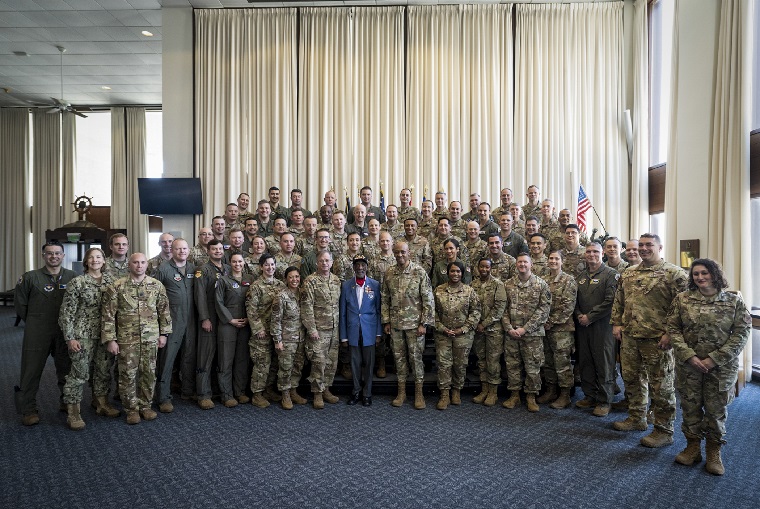U.S. Naval War College Hosts Air Force Vanguards: CSAF General C. Q. Brown and Tuskegee Airman "Woody" Woodhouse

NEWPORT, RI – General Charles Q. Brown, Chief of Staff of the Air Force (CSAF), and Brig. E. “Woody” Woodhouse, one of the last surviving Tuskegee Airmen, visited faculty, staff, and students at the U.S. Naval War College (NWC), April 4.
Brown delivered remarks on the global security landscape and the concepts, capabilities, and culture needed to succeed in the current era of great power competition.
He advised attendees that his focus as chief of staff has been on preparing for challenges before they arise. “We can't wait for a crisis to drive change. Rather, we need to preemptively change knowing that the need to do so is inevitable,” urged Brown.
This appeal was inspired by Former President Dwight D. Eisenhower as well as General Giulio Douhet, Italian Army general and father of strategic air power who advocated for the military to anticipate changes in the character of war.
Ninety-six-year-old Woodhouse and his august experience as a Tuskegee Airman were also recognized by Brown as a formidable source of inspiration throughout the chief of staff’s 30-year tenure in the U.S. Air Force (USAF).
The Tuskegee Airmen were the first Black military aviators in the U.S. Army Air Corps (AAC), the antecedent to today's USAF.
The ideology of change was the impetus behind Brown’s authoring "Accelerate Change or Lose,” an assessment detailing why the USAF must accelerate change to maintain its status as the most dominant and respected air force in the world. The resultant action order items of that assessment - airmen, bureaucracy, competition, and design and limitations – were discussed in detail.
Brown also presented students with concepts that, he contended, drive culture: Integrating [allies and partners] by Design, Mission Command, the USAF Force Generation Model (AFFGEN), Agile Combat Employment (ACE), Multi-capable Airmen, and Wing-A Staff Construct. He advised students to stay abreast of happenings around the world, build relationships, cultivate a vision, self-assess, broaden their perspectives, and lead themselves before leading others.
He also counseled them that, as future senior leaders, several things matter: their credibility, their words/signature, and their relationships.
“Credibility matters to mitigate mistakes and words matter, for they will be repeated,” Brown explained. “Relationships are important also because you never want to cold call in a crisis or burn a bridge you may need to cross later.”
NWC delivers excellence in education, research, and outreach, informing today’s decision-makers and educating tomorrow’s leaders. The college provides educational experiences and learning opportunities that develop students’ ability to anticipate and prepare strategically for the future, strengthen the foundations of peace, and create a decisive warfighting advantage.
